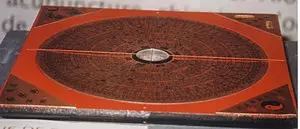
Do you ever feel like your home or workplace could use a little more positive energy? If so, you may want to consider incorporating the ancient Chinese art of Feng Shui into your space. Feng Shui, which translates to "wind and water," is a practice that aims to harmonize the energy in our environment, promoting well-being, health, and prosperity for its occupants. It is based on the principles of Taoist philosophy, similar to traditional Chinese medicine and acupuncture.
The Art and Science of Feng Shui
Feng Shui is a millennium-old philosophy and a pseudoscience that focuses on the observation of nature and the interconnectedness of all things. It seeks to arrange living spaces in a way that optimizes the flow of visible and subtle energies, known as qi. By creating a harmonious and balanced environment, Feng Shui aims to enhance the overall quality of life.
 Fig.1: The essence of Feng Shui lies in harmonizing the energy of a space.
Fig.1: The essence of Feng Shui lies in harmonizing the energy of a space.
According to Feng Shui principles, there are two main approaches: "Yang Feng Shui" and "Yin Feng Shui." Yang Feng Shui focuses on arranging living spaces for the well-being of its occupants, while Yin Feng Shui is used primarily in the organization of burial sites, aimed at ensuring the perpetuity of descendants over several generations.
The Fundamentals of Feng Shui
Feng Shui is deeply rooted in Chinese philosophy, particularly Taoism. It is an application of Taoist principles to our living spaces and involves various theories, such as Yin and Yang, the Five Elements, Qi, Bagua, and Yi-Jing.
Qi: The Vital Energy
At the core of Feng Shui is the identification and optimization of qi, the vital environmental energy. By understanding the interaction of yin and yang, the five elements, and the trigrams of the Bagua (a symbol representing the eight fundamental aspects of life), Feng Shui practitioners can identify the flow of qi within a space.
Yin and Yang: Balancing Energies
In Feng Shui, the yin and yang principle is used to evaluate and determine the nature of an environment. Spaces can be predominantly yin, yang, or in perfect balance, which is essential for creating harmonious surroundings.
The Five Elements: Wu Xing
The Five Elements, also known as Wu Xing, provide a classification system for the elements in our world. These elements are wood, fire, earth, metal, and water, each with its own characteristics and associations. Feng Shui uses these elements to analyze and influence the flow of qi. Different shapes, colors, and materials correspond to each element, and by incorporating them strategically, one can enhance the desired energy in a space.
The Role of Time
Time is a vital factor in Feng Shui, as the cyclical transformation of qi properties is influenced by specific periods. The Chinese lunar calendar helps identify and understand the annual, monthly, and daily influences on qi qualities. This knowledge enables Feng Shui practitioners to select auspicious times for important activities and make appropriate adjustments in living spaces.
The Compass and the Bagua
A compass, also known as a Luopan, is an essential tool in the practice of Feng Shui. It consists of multiple rings, each with specific indications used in different systems. The Luopan is necessary for determining directions, identifying auspicious locations, and assessing energy flow in a space.
Fig. 2: The Luopan, an indispensable tool in Feng Shui practice.
The Bagua, an octagonal diagram, is another crucial element in Feng Shui analysis. It is used to position and align different elements within a space, representing the eight directions and their corresponding qualities. There are two representations of the Bagua: the "Anterior Heaven" and the "Posterior Heaven." These arrangements symbolize the different stages of life and the interactions between opposing forces.
The History and Evolution of Feng Shui
The origins of Feng Shui can be traced back thousands of years to ancient China. Legend has it that the compass was first invented during the reign of the Yellow Emperor and later adapted for use in Feng Shui practices.
Throughout history, Feng Shui went through different phases of development and refinement. During the Tang and Song dynasties, Feng Shui flourished and saw significant advancements. Notable masters, such as Yang Junsong, made significant contributions to the field.
In modern times, Feng Shui continues to play a significant role in Chinese architecture and urban planning. It is especially prominent in cities like Hong Kong, where buildings are constructed with Feng Shui principles in mind. However, Feng Shui has also gained popularity in the Western world since the 1980s.
Feng Shui: A Practice and its Critics
Feng Shui is both an art and a pseudoscience. It is important to note that Feng Shui's principles lack scientific evidence and have not been proven through rigorous scientific protocols. As a result, skeptics challenge its concepts and the unverifiable connection between the physical environment and human well-being.
Critics argue that Feng Shui relies on unfounded and superstitious beliefs, making it difficult to evaluate with scientific methods. They call for scientific studies to examine the impact of Feng Shui on health and other aspects of life.
In the past, Feng Shui faced opposition and criticism, including from missionaries such as Matteo Ricci, who regarded it as a superstitious practice. During the Chinese Cultural Revolution, Feng Shui was viewed as a feudal superstition and discouraged or even banned. Today, while its influence has diminished in mainland China, Feng Shui continues to thrive in Hong Kong and other regions where traditional Chinese culture remains intact.
Embracing Feng Shui
Whether you approach Feng Shui as an art form, a philosophy, or a pseudoscience, there is no denying its enduring popularity and impact in traditional Chinese culture. Incorporating Feng Shui principles into your living or working spaces can create a sense of harmony and balance, promoting a positive atmosphere and enhancing your overall well-being.
Remember, Feng Shui is not just about following strict rules, but rather about finding a balance that aligns with your personal culture and taste. By embracing the principles of Feng Shui, you can create an environment that nurtures and supports you in your journey through life.
References in Markdown format

















